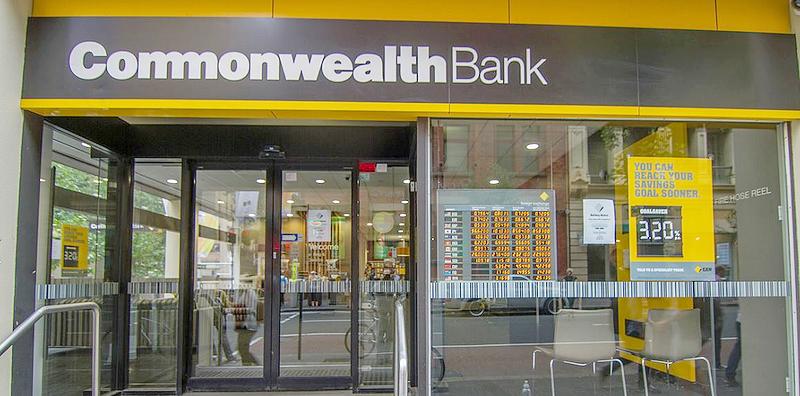Pioneer Global Blockchain Bond Stirs ‘Huge Interest’

A branch office of the Commonwealth Bank of Australia in Sydney, April 2, 2015 (Photo by Maksym Kozlenko)
By Sunny Lewis
SYDNEY, Australia, September 11, 2018 (Maximpact.com News) – Using the Commonwealth Bank of Australia as arranger, the World Bank has launched the world’s first bond to be created, allocated, transferred and managed through its life cycle using blockchain distributed ledger technology.
Named bond-i, or Blockchain Offered New Debt Instrument, the two-year bond has raised A$110 million. The name is also a reference to Bondi Beach, a famous Sydney recreational haven.
This is the first time that investors have supported the World Bank’s development activities in a transaction that is fully managed using blockchain technology.
Blockchain is a distributed ledger technology that enables permissioned sharing of an immutable record among parties to create consensus and trust. It empowers multiple trading partners to collaborate and establish a single shared view of a contract without compromising details, privacy or confidentiality.
The World Bank mandated Commonwealth Bank of Australia (CBA) as arranger for the bond on August 10. The announcement was followed by a two-week consultation period with the market, with key investors indicating strong support for the bond’s issuance.
James Wall, executive general manager of IB&M International, CBA said, “It is clear the market is ready and open to the uptake of emerging technologies and sees the potential evolution of the capital markets. It has been a pleasure to work on such a ground-breaking transaction with a forward-thinking organization like the World Bank.”
Investors in the bond-i include Commonwealth Bank of Australia, First State Super, New South Wales Treasury Corporation, Northern Trust, QBE Insurance Group, SAFA, and Treasury Corporation of Victoria.
The bond is part of a broader strategic focus of the World Bank to harness the potential of disruptive technologies for development.
In June 2017, the World Bank launched a Blockchain Innovation Lab to understand the impact of blockchain and other disruptive technologies in areas such as land administration, supply chain management, health, education, cross-border payments, and carbon market trading.
World Bank Treasurer Arunma Oteh said, “I am delighted that this pioneer bond transaction using the distributed ledger technology, bond-i, was extremely well received by investors. We are particularly impressed with the breath of interest from official institutions, fund managers, and banks. We were no doubt successful in moving from concept to reality because these high-quality investors understood the value of leveraging technology for innovation in capital markets.
“Our painstaking work, over the last year, and in partnership with Commonwealth Bank of Australia, was equally instrumental to the success of the transaction. Commendation also to our other service providers, King & Wood Mallesons, IHS Markit, Microsoft and Toronto Dominion Securities,” said Oteh, who hails from Nigeria.
“We welcome the huge interest that this transaction has generated from various stakeholders,” she said.
The bond-i blockchain platform was built and developed by the CBA Blockchain Centre of Excellence, housed in the Sydney Innovation Lab. This project builds on the leadership and experience of CBA’s dedicated blockchain team, which has taken a lead role in applying blockchain technology to capital markets.
Foundation investors in bond-i contributed to the project through their feedback on the platform structure and functionality.
Derek Yung, COO Group Investments, QBE Insurance Group Limited, said, “We believe there is untapped potential for the application of this product to capital markets and are pleased to be involved as an early investor.”
William Whitford, managing director, Treasury Corporation of Victoria, said, “TCV is proud to play a part in the first global blockchain bond. The opportunity to be involved in innovation like this is a privilege, and both CBA and the World Bank Treasury team are to be congratulated in their leadership in this space.”
Service providers to the bond’s platform include TD Securities as market maker, IHS Markit as independent valuation provider, Microsoft as independent code reviewer, and King & Wood Mallesons as deal counsel.
The World Bank issues between US$50 billion and US$60 billion annually in bonds for sustainable development. It has a 70-year track record of innovation in the capital markets.
Bond-i will come to maturity on August 28, 2020. The Commonwealth Bank of Australia and the World Bank say they will welcome investor interest in the bond throughout its two-year life cycle, as well as inquiries about the platform from other market participants.
Australia is moving to establish itself as a blockchain-friendly country with which to do business.
Late last month, the Australian government research agency CSIRO formed a consortium with law firm Herbert Smith Freehills and IBM to build Australia’s first cross-industry, large-scale, digital platform so Australian businesses can collaborate using blockchain-based smart legal contracts.
Known as the Australian National Blockchain (ANB), the new platform represents a new piece of infrastructure in Australia’s digital economy, enabling companies nationwide to join the network to use digitized contracts, exchange data and confirm the authenticity and status of legal contracts.
Blockchain is a public register in which transactions between multiple users belonging to the same network are stored in a secure, verifiable and permanent way. The data relating to the exchanges are saved inside cryptographic blocks, connected to each other in a hierarchical manner.
This creates an endless chain of data blocks – hence the name blockchain – that allows a user to trace and verify all the transactions he or she has ever made.
Blockchain technology enables secure trading without a centralized exchange, making it attractive for cryptocurrency, where it was applied first to bypass banks, and for large decentralized energy systems with a high share of renewable energy.
Once completed, the Australian National Blockchain will enable organizations to digitally manage the lifecycle of a contract, not just from negotiation to signing, but also continuing over the term of the agreement, with transparency and permissioned-based access among parties in the network. The service will provide organizations the ability to use blockchain-based smart contracts to trigger business processes and events.
ANB will provide smart legal contracts that contain smart clauses with the ability to record external data sources such as Internet of Things device data, enabling these clauses to self-execute if specified contract conditions are met.
For example, construction site sensors could record the time and date of a delivery of a load on blockchain and trigger a smart contract between the construction company and the bank that would automatically notify the bank when terms are met to provide payment on that delivery.
Paul Hutchison, vice president and partner, Cognitive Process Transformation, IBM Global Business Services, said, “Blockchain will be to transactions what the internet was to communication – what starts as a tool for sharing information becomes transformational once adoption is widespread. The ANB could be that inflection point for commercial blockchain, spurring innovation and economic development throughout Australia.”
Featured image: Gold metallic blockchain extruding from encrypted code background, March 13, 2018 (Image by QuoteInspector) Creative Commons license via Flickr
